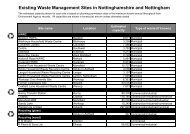Nottinghamshire Common Assessment Framework Handbook
Nottinghamshire Common Assessment Framework Handbook
Nottinghamshire Common Assessment Framework Handbook
Create successful ePaper yourself
Turn your PDF publications into a flip-book with our unique Google optimized e-Paper software.
Appendix O<br />
<strong>Common</strong> <strong>Assessment</strong> <strong>Framework</strong><br />
Terms of Reference– May 2010<br />
Overall Purpose: To support the strategic implementation of the <strong>Nottinghamshire</strong> CAF Quality Assurance <strong>Framework</strong> and<br />
contribute to the development and implementation of future policy and strategy relating to CAF Quality Assurance and<br />
related activity at local, regional and national level.<br />
The CAF Quality Assurance Group will support the achievement of the <strong>Nottinghamshire</strong>’s Children’s Trust Vision to ensure<br />
that “we will work together to provide integrated services for all children and young people in <strong>Nottinghamshire</strong> to improve<br />
their life chances and help them to maximise their potential”.<br />
Aims<br />
1. To provide opportunities for partners across the Children’s Trust to come together to support the implementation of<br />
<strong>Nottinghamshire</strong> CAF Quality Assurance <strong>Framework</strong> to improve the outcomes for children and young people in<br />
<strong>Nottinghamshire</strong> through providing a consistent approach to the CAF across the Children’s Trust.<br />
2. To advise the Early Intervention Working Group on the implementation of national, regional and local strategies<br />
and guidance.<br />
3. To monitor and oversee the implementation of the East Midlands Regional Standards for CAF and Integrated Working<br />
Practices and the <strong>Nottinghamshire</strong> CAF Quality Assurance <strong>Framework</strong>.<br />
4. To undertake a systematic and rigorous approach to performance management, involving both quantitative and<br />
qualitative data analysis utilising the <strong>Nottinghamshire</strong> Quality Assurance <strong>Framework</strong> (see appendix 2).<br />
5. To have an overview of how the CAF is being implemented across <strong>Nottinghamshire</strong> aiming to improve early ntervention<br />
and preventative working arrangements.<br />
6. To inform and influence the strategic direction of the Children’s Trust through the Early Intervention Working Group to<br />
ensure that early intervention and preventative working arrangements are improved.<br />
7. To act as a conduit for information, guidance, policy and practice on early intervention and preventative working<br />
arrangements between the Children’s Trust Board, it’s Executive, sub groups and themed partnership groups.<br />
8. To proactively listen to and engage with children, young people and families on an ongoing basis as is necessary and<br />
ensure that issues are considered and responded to.<br />
9. To strengthen accountability and partnership arrangements for using the CAF.<br />
10. To consider the outcomes of each audit, including any feedback from practitioners, children, young people and their<br />
families that have been part of the quality assurance process, and identify any further action.<br />
11. To recognise elements of best practice through the Quality Assurance process and capture the learning for<br />
disseminating to members of the Children and Young People’s Workforce.<br />
12. To ensure that all policies, strategies and joint commissioning activity is in line with equality and diversity legislation<br />
e.g., ensuring that Equality Impact <strong>Assessment</strong>s are a routine component of all guidance, policies issued.<br />
13. To ensure that the safeguarding of children is given the fullest consideration in the development of early intervention<br />
and preventative working arrangements.<br />
14. To strengthen joint commissioning and planning activity to reflect the need to identify children and young people at risk<br />
to enable earlier interventions to prevent poor outcomes and the need for specialist interventions at a later date.<br />
15. To act as a conduit for the development and implementation of the Children’s Trust Workforce Strategy in relation to<br />
early intervention and preventative working arrangements.



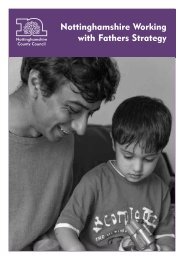
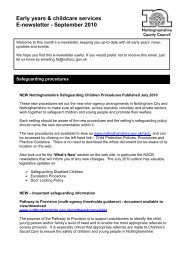
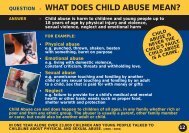

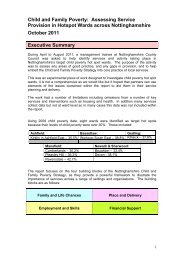

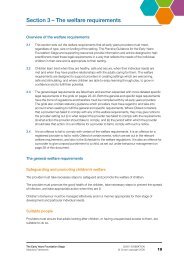
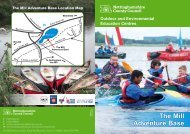
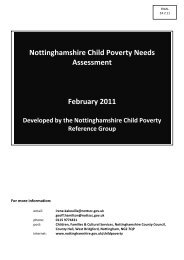
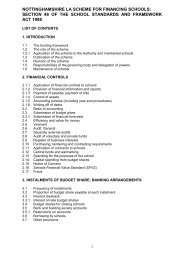
![Every Parent Matters [PDF 463KB] - Nottinghamshire County Council](https://img.yumpu.com/47250686/1/184x260/every-parent-matters-pdf-463kb-nottinghamshire-county-council.jpg?quality=85)

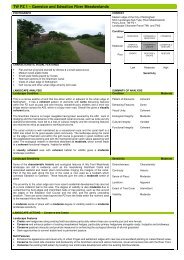
![School Employee Domestic Violence and Abuse Policy [PDF 228KB]](https://img.yumpu.com/46294446/1/184x260/school-employee-domestic-violence-and-abuse-policy-pdf-228kb.jpg?quality=85)
